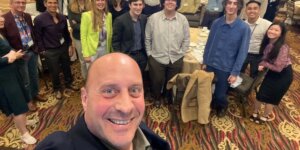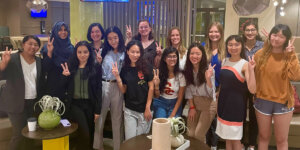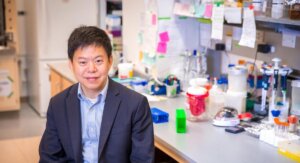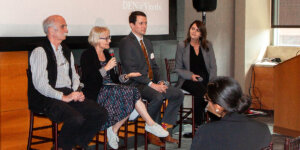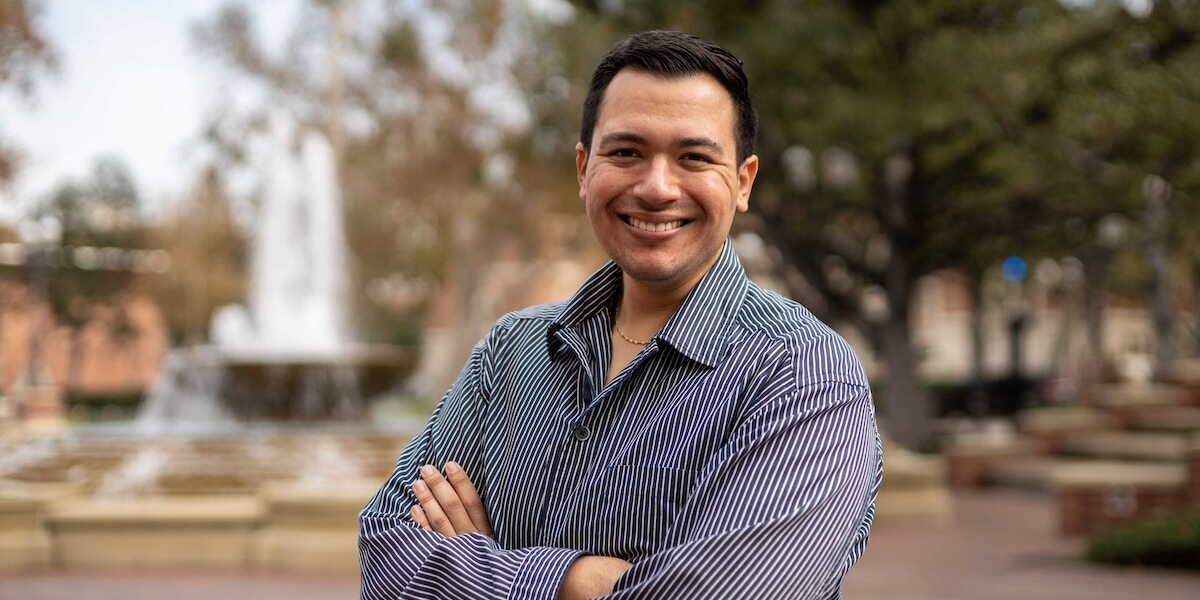
PH.D. STUDENT OF CHEMICAL ENGINEERING ARMANDO URBINA (PHOTO/COURTESY OF ARMANDO URBINA)
When 23-year-old Armando Urbina came to USC Viterbi for a Ph.D. in chemical engineering in August 2020, he wasn’t planning on becoming a social justice hero.
The first-generation Mexican-American had many things go his way to become a Trojan; it would have been impossible without a Graduate Research Fellowship by the prestigious National Science Foundation (GRFP); the mentorship he received as a high school and undergraduate student at the University of California San Diego (UCSD); and the support of USC professor Andrea Armani, who recruited him as a Ph.D. student to conduct research at her laboratory for the next five years.
Urbina knew first-hand how hard it is to break the glass ceiling, but he was still surprised by the lack of Latinos when he reached the height of the academic ladder.
“I heard the statistic in my first year at UCSD, and it really struck me that only 4.5% of advanced degrees have been awarded to Latinos in the United States,” Urbina said. “And when I came to USC, I realized that there weren’t a lot of Latinos in Ph.D. programs, so I started to showcase the education aspect of being in a Ph.D., what it means.”
Shortly after enrolling at USC, Urbina was encouraged by his roommate, fellow Latina and Ph.D. student Emily Anne Vargas, to join the USC chapter of the Society of Hispanic Professional Engineers (SHPE). SHPE is the largest organization supporting Hispanic leadership in STEM in America, but the SHPE-USC chapter had only four active graduate members before Urbina at the time.
“I’m an extrovert, and I have a habit of voicing my opinions,” Urbina said. “When I realized the number of resources available to succeed, I wanted other people to see them as well.”
Recognizing a leader with purpose
Urbina, who joined SHPE-USC during the “COVID summer” of 2020, immediately started promoting the club as a safe space to decrease feelings of isolation and loneliness exacerbated by the pandemic. In 2021, he became one of two graduate representatives in SHPE-USC and has served as the Equity, Diversity, and Inclusion Senator in the USC Viterbi Graduate Student Assembly.
Over the past three years, Urbina has worked tirelessly to promote initiatives around community-specific concerns, such as impostor syndrome, and the first-generation experience.
“The SHPE-USC graduate committee became a place where you kind of mix work with a social aspect, where you can be open and honest about your struggles and not be judged,” Urbina said. “In conjunction with that, we had events like First Fridays. We would bring guests to highlight a different first generation experience every week. That has been cool because you don’t really see many Latinos in C-suite positions.”
In April 2024, less than three years after Urbina first joined, SHPE awarded him the regional LeaderSHPE excellence award, which recognizes his efforts to empower Hispanic leadership in STEM. He beat out candidates from all over the Southwest, including Alaska, Arizona, Hawaii, and Southern California. Meanwhile, with over 20 active members, SHPE-USC has expanded to become one of the largest graduate communities in the national SHPE network.
Promoting empowerment beyond the Hispanic community
Urbina’s commitment to support his peers extends beyond the Latino community.
As an undergraduate student at the University of California San Diego, Urbina participated in the pilot project of the school’s Graduate Application Mentorship Program (GradAMP), which supports aspiring Ph.D. candidates in engineering. Students considering a Ph.D. are paired with a doctoral student to coach them throughout the seven-month application process. The Ph.D. students provide support and feedback on a variety of topics, including how to best fulfill the application requirements, pass the interviews, and evaluate offers from different schools.
To date, Urbina’s version of GradAMP has helped 18 USC students on their journey to an advanced degree. Among them is Hari Sridhara, who became a Ph.D. student at the Georgia Institute of Technology in 2023 after participating in GradAMP and securing the same graduate research fellowship as Urbina.
“Working with Armando convinced me to pursue a Ph.D. myself, a decision I’m very happy with now that my first year is almost complete,” Sridhara said. “But most importantly, I am grateful to have such a kind, supportive, and service-minded person I can count on as a mentor and friend. I hope to pay forward the time he invested in me when I’m mentoring undergraduates as well.”
Urbina’s relationship to Sridhara also demonstrates his dedication to fostering solidarity in science education beyond GradAMP: after working together on a research project, the pair taught other engineering students how to replicate their complex work. The teaching laboratory culminated in a paper that was accepted for publication in the American Chemical Society’s Journal of Chemical Education.
Leading by example, Urbina cultivates his peers’ scientific curiosity, academic rigor, and altruism, helping them meet the high expectations of the academic environment and support their colleagues on similar journeys: this is the Urbina Effect.
A helper since high school
Urbina’s mission to help others started long before he attended college.
When he was a student at the High Tech High Chula Vista in San Diego, the 16-year-old Urbina was already involved in health-related research. In 2014, Urbina spent the summer at UCSD to fulfill his high school’s internship requirement. Specifically, his job was to assist a Ph.D. student of chemical engineering, Brandon Marin, who was testing new combinations of materials to build affordable devices for complex health problems like heart diseases.
A fellow first-generation Mexican American, Marin encouraged Urbina to enroll in the chemical engineering program at UCSD as an undergraduate and later apply for a Ph.D. at USC under his former mentor, Armani. Marin, who earned his bachelor’s degree at USC, knew that Urbina would succeed because of his scientific acumen.
“I remember one time, when he was still in high school, I forgot to leave him instructions while I was away for the morning, and he actually looked at my notes and finished the project,” Marin said. “Not only did he do what I would have done, but he took the initiative to adapt on the spot and had the confidence to go and do the right thing.”
At USC Viterbi, Urbina works on materials that improve the development of human organs and tissue in the laboratory. He hopes his research will advance scientific understanding of how the body reacts to different treatments and diseases and paves the way for personalized treatment options.
“Even though I’m a chemical engineer, my research is all in materials because I believe I can have the most immediate impact on people as a materials scientist,” he said.
Published on May 22nd, 2024
Last updated on May 22nd, 2024




